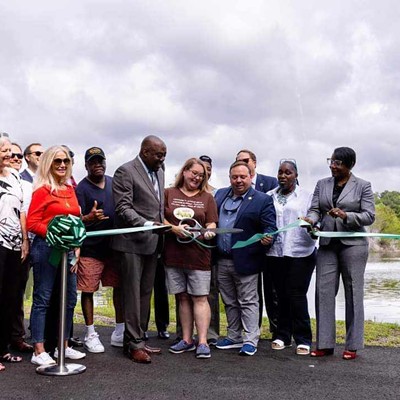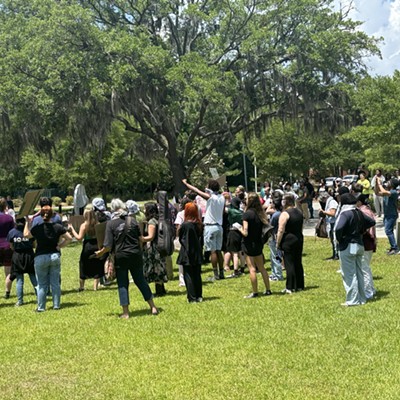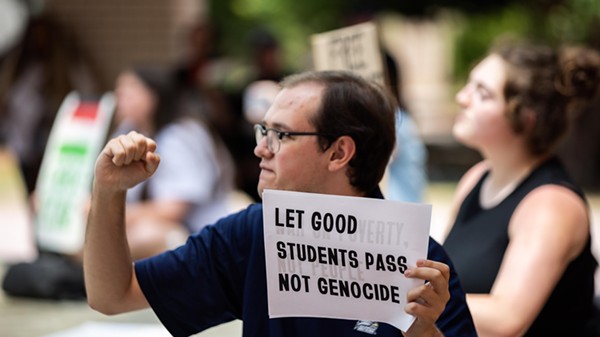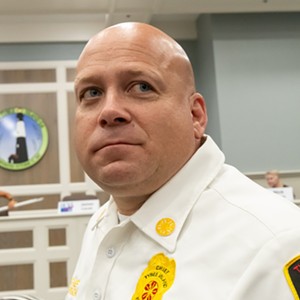I call it the Lucy van Pelt effect. When I set up a tent and table at a public event, I'm reminded of the Peanuts character and her "Psychiatric Help" booth. Unfurling the Savannah Bicycle Campaign banner (vinyl, 6-foot) announces, "The Doctor Is In." Folks who have no particular interest in bicycling themselves often approach the table to tell me about their problems with cyclists. If I only had 5 cents, Lucy's standard rate, for each time I listened politely to an account of bicyclist misbehavior!
Some of these stories are rooted in authentic concern about the safety of cyclists. Others voice their complaints as pedestrians, for whom reckless cyclists are a worry. Others, however, are clearly speaking from their experiences as drivers and their statements reveal a resentment of cyclists and an unwillingness to share the road with those they regard as disrespectful of the rules. This mindset somehow excuses the transgressions of other motorists, however. I doubt these drivers would walk up to an AAA table at an event and complain about the way other people drive.
There are plenty of theories to explain why cyclists draw such disproportionate ire. Is it fundamental attribution error, the tendency to stereotype an entire group based on the actions of individual members? The status of cyclists as an "outsider" group? Lack of familiarity with traffic regulations and the rights of cyclists? Whatever the reason, some people are clearly convinced that cyclists are dangerous, based on the things they've seen them do through the windshields of their cars. The reality, of course, is that motorists have little to fear from reckless or inattentive cyclists. Despite the complaints I receive when I'm in Lucy mode, I've yet to hear someone say they have given up driving after a negative encounter with a bicyclist.
On the other hand, when I'm staffing the Savannah Bicycle Campaign booth at an event, I frequently hear pained confessions from people who have given up something they enjoyed— even loved — because they feared being hit by an aggressive or distracted driver. Sometimes it's a near miss or the injury of a friend or family member that causes them to stop cycling. These stories are relayed with a tinge of sadness and often anger. It's understandable. Their right to operate their vehicles (bicycles are classified as just that under state law) has effectively been taken away from them.
The most disconcerting of these stories come from people who depended on their bicycles for transportation. And from those who recognized the positive effects bicycling had on their lives and on the community at large. Compare this worldview with those of some drivers, who regard cyclists as nuisances at best and a menace at worst, and you come to appreciate a significant difference of opinion. Is there any possibility for accord between the two sides?
Two recent events give me hope.
On March 23 a bipartisan group of lawmakers (that means Democrats and Republicans, believe it or not) sent a letter to U.S. Transportation Secretary Ray LaHood calling on him to "set separate performance measures for non-motorized and motorized transportation." This would result in "an incentive for states to reduce bicyclist and pedestrian fatalities." Caron Whittaker, vice president of government relations for the League of American Bicyclists, is encouraged by the letter. "This is exactly the time to establish meaningful national goals and performance measures to tackle bicyclist and pedestrian safety as part of an overall, comprehensive and multi-modal traffic safety program," she wrote on the organization's blog.
Closer to home, a bipartisan group of lawmakers welcomed hundreds of cyclists to the Georgia capitol on March 26. More than 20 elected officials biked along with the cyclists in the 8th annual Georgia Rides to the Capitol event. Once there, they were addressed by Lt. Gov. Casey Cagle and other officials, who noted "the vital importance of improved bicycle safety and accessibility in Georgia," according to Brent Buice, executive director of the advocacy group Georgia Bikes!
Increased attention to the safety of bicyclists on the national, state and local levels can help coax reluctant cyclists back onto their bikes, begin healing rifts between cyclists and drivers, and provide more transportation choices for Americans. That seems like a goal we should all be able to share.

























